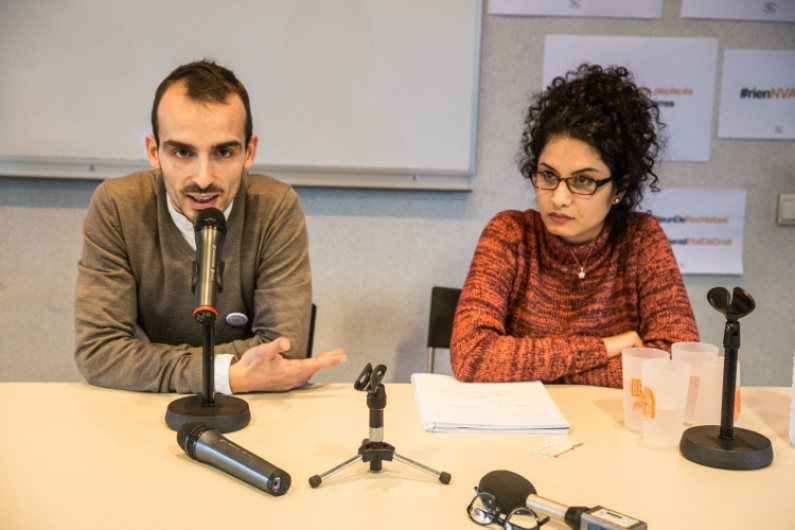
Raneem Matouk: How to survive a Syrian prison
Published on
According to Amnesty International, more than 18,000 people have died in Syrian prisons under Bashar Al-Assad's regime. Raneem, a Syrian refugee who has lived in Germany since 2015, spent four months in prison, where torture was part of her everyday life.
A lot has been aired about the airstrikes and hordes of Syrian refugees fleeing their country but not so much has been said about arbitrary arrests and tortures in prisons across the whole country. The Syrian Network for Human Rights, an independent and non-partisan organisation, claims to possess lists of over 117,000 detainees with no criminal charges against them.
Amnesty International (AI) issued a report last August claiming that 17,723 people had been killed. Survivors have spoken of torture, forced confessions, "welcome party" beatings, rape, electric shocks, solitary confinement and other psychological and physical mistreatment. To shed some light on their situation, Amnesty launched a campaign which involved creating a 3D model of the infamous Saydnaya prison, based on prisoners' testimonies.
Amnesty International says most of the people arrested are peaceful activists, journalists, writers and human rights defenders. Raneem Matouk, a fine arts student who spent four months under custody of the Syrian authorities, fits that description. Her only crimes were participating in peaceful protests against the government, and being daughter of a well-known human rights lawyer.
Raneem’s agony started with an unexpected visit from a group of policemen. Thirty officers broke into the house; all of them looking to arrest a girl of 5'2", cowering in her own home with her mother and little brother. She was taken to a detention centre in Kafar Souseh, in Damascus, more than two hours away by car from her native Homs.
25-year-old Raneem, who has lively dark eyes and dark curly hair, explains her situation in a conference organised last December in Brussels by a local citizens' platform for the support of refugees. More than a hundred people packed out a classroom. She starts by asking if there are any kids in the room: the story she is about to tell is not suitable for minors and sensitive people.
But Raneem remains undaunted when explaining the ironically-named "welcoming ceremony" at the police station. Abandoning her usual smile, she explains how the officers put her naked against the wall. "They stripped and frisked us. They started beating us up without asking any warning, mostly my face and my head. They took it out on me."
She shared a cell measuring two metres by four metres with nine other women, some of whom were pregnant. There were only five mattresses on the floor. They had to take turns sleeping, or at least trying to: "From our cell, we could see the torture chambers. They were even using electricity." Through her interpreter, she explains how officers attacked and raped them. "24 hours a day we could hear people screaming. The smell of death was with us all the time. There was a small window in the iron door which we spent our time watching in case we saw somebody we knew, particularly a family member."
 According to Raneem, the prisons of the regime have other purposes further than repression: "I've seen people taken away from their cells to have their organs removed, then thrown back in there to die. Sometimes corpses stayed within the cells for days, where other inmates continued living."
According to Raneem, the prisons of the regime have other purposes further than repression: "I've seen people taken away from their cells to have their organs removed, then thrown back in there to die. Sometimes corpses stayed within the cells for days, where other inmates continued living."
One day, she had enough and started a hunger strike. The governor called her to his office, where there was already another girl who had come up with the same idea. Raneem doesn’t tell what happened to her, as if she didn’t want to remember, but relates how her colleague got raped, being obliged to sit on a bottle.
In June, after four months of smelling death, Raneem was brought to court, where the judge asked her if she had money. Luckily for her, she did – she went home.
Suddenly, her smile comes back to her face. "Sometimes I laugh or we do theatre about what happens in prisons." She explained to me how once, in university, she heard a mortar attack. A friend who was with her said: "Shall we go see if someone needs help?" She replied, chuckling: "OK, but if we die it will be on you."
"We transform fear into jokes," she says. "Every day, when leaving for my university lessons, I had to say goodbye to my mother, my brother, my friends… Would we ever see each other again? Every day could be our last."
After leaving prison, Raneem knew it was time to escape. She took a taxi to the border with Lebanon, 20 kilometres from Homs. She got lucky: the taxi driver turned out to be against the regime too. When she got to the border a customs officer stopped her, but he knew a relative of hers and let her go. Once in Lebanon, the driver dropped her off, making her promise to "never ever ever come back." Few days after, she applied for a refugee visa at the German embassy in Beirut. Now she is safe and living in Neubrandenburg.
Raneem is not sure if she will keep her promise to the taxi driver. She wants to return home once the rule of law is back. "It depends on the attitude of Russia and the US and when they decide to put an end to Al Assad. Germany is very very tough. Syria is a very beautiful land. I cannot imagine someone living in my house."



